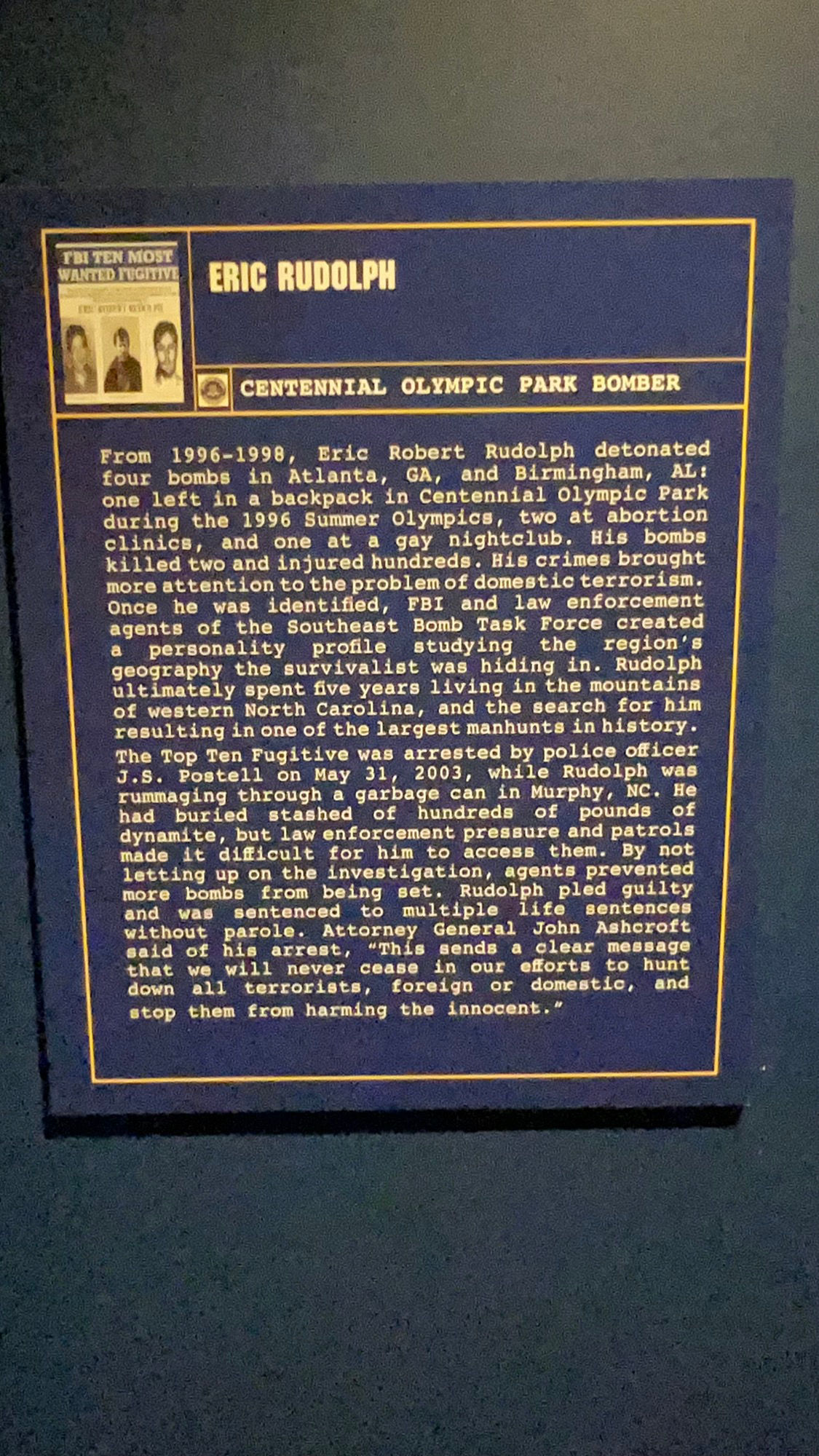
Eric Rudolph
From 1996-1998, Eric Robert Rudolph detonated four bombs in Atlanta, GA, and Birmingham, AL: one left in a backpack in Centennial Olympic Park during the 1996 Summer Olympics, two at abortion clinics, and one at a gay nightclub. His bombs killed two and injured hundreds. His crimes brought more attention to the problem of domestic terrorism. Once he was identified, FBI and law enforcement agents of the Southeast Bomb Task Force created а personality profile studying the region's geography the survivalist was hiding in. Rudolph ultimately spent five years living in the mountains of western North Carolina, and the search for him resulting in one of the largest manhunts in history.
The Top Ten Fugitive was arrested by police officer J.S. Postell on May 31, 2003, while Rudolph was rummaging through a garbage can in Murphy, NC. He had buried stashes of hundreds of pounds of dynamite, but law enforcement pressure and patrols made it difficult for him to access them. By not letting up on the investigation, agents prevented more bombs from being set. Rudolph plead guilty and was sentenced to multiple life sentences without parole. Attorney General John Asheroft said of his arrest, "This sends a clear message that we will never cease in our efforts to hunt down all terrorists, foreign or domestic, and stop them from harming the innocent."
FBI Eric Rudolph
Between 1996 and 1998, bombs exploded four times in Atlanta and Birmingham, killing two and injuring hundreds and setting off what turned out to be a five-year manhunt for the suspected bomber Eric Robert Rudolph.A skilled outdoorsman, Rudolph managed to elude law enforcement officials for years while hiding out in the mountains in western North Carolina before being captured in 2003.
The Attacks
Rudolph began his violent attacks on July 27, 1996. As spectators watched the 1996 Summer Olympics, he planted a bomb in Centennial Olympic Park in Atlanta. The subsequent blast killed one woman who had traveled with her daughter to watch the Olympics and harmed more than 100 other people. Before the bomb detonated, Rudolph twice called 911 to warn about the bomb.Over the next two years, Rudolph placed two more bombs in Georgia and one in Birmingham, Alabama. The resulting blasts caused several injuries and the death of a police officer.
The FBI placed Rudolph on the Ten Most Wanted Fugitives list on May 5, 1998.
On May 31, 2003, Rudolph was arrested by police officer J.S. Postell while rummaging through a trash bin behind a rural grocery store in Murphy, North Carolina.
Rudolph pleaded guilty to federal charges stemming from the four bombings. He is currently serving multiple life sentences without the possibility of parole.
As part of his plea deal, Rudolph also revealed where he had stashed 250 pounds of dynamite. The FBI and the Bureau of Alcohol, Tobacco, Firearms, and Explosives dispatched teams to locate the dynamite and dispose of it.
Interview on the Case
Former FBI executive Chris Swecker, who headed our Charlotte office when the arrest was made, shared behind-the-scenes information about the relentless pursuit and capture of the survivalist bomber.Q: Why was the Southeast Bomb Task Force so convinced that Rudolph was hiding in western North Carolina?
A:Mr. Swecker: Because of his personal makeup and overall familiarity with the area-and the fact that there were no credible sightings anywhere else. A lot of people at the highest levels said, ‘He's dead; he's gone.' But three members of the task force in particular kept the focus on western North Carolina. If not for them, the whole investigation might have dwindled down to just one or two agents. They were adamant he was in the area, absolutely adamant, in the face of a lot of skepticism. I think 90 percent of the population had written off Rudolph as being out of the area, long gone, or dead.Q: What was the on-site strategy of the task force?
A:Mr. Swecker: They had a great plan because it actively involved local law enforcement-keeping them up to speed on where the sightings were and keeping in close contact. Also, even though there was so little to go on, they had really done their homework. They got to know the geography; they'd done a personality profile; they regularly contacted family members; they had a whole cadre of scouts who were walking the forest area and reporting back to us what they saw.Q: Did anybody help Rudolph avoid detection?
A:Mr. Swecker: That's what a lot of people think. But Rudolph is such a loner that we strongly believed he simply wouldn't have trusted anybody. He had access to news; he had newspaper articles in his camp. He knew he was being pursued. I don't think he would have made himself vulnerable to being compromised or betrayed by letting anyone know where he was.Q: Did the pursuit keep him from carrying out more attacks?
A:Mr. Swecker: Absolutely. Rudolph admitted that he'd toyed with going after the agents who were pursuing him. We know he buried at least four caches of explosives in the area. One was right above the National Guard armory where our command post was located. He claimed he made the decision not to booby-trap our post. But I think he didn't because we kept the pressure on him, kept patrols going, kept a visible presence. He just couldn't get to his explosives and do what he would have liked to have done. That was the primary reason we were there. We wanted to catch him, but we also wanted to make sure he didn't strike again. I'm convinced that the investment of manpower we had during that time period saved lives.Q: What did Rudolph look like when he was captured?
A:Mr. Swecker: He was thin, much thinner than when he first went into the mountains, but in very good shape. He talked about being very sick in the first winter, malnourished. After that, things kind of steadied for him.Q: Rudolph was finally caught foraging for food at a grocery store dumpster. How else did he gather food?
A:Mr. Swecker: A number of ways. His campsite had a lot of storage. He had a bunch of 55-gallon barrels buried in the ground, full of grain, soy, and oats. There was a granary about four miles from there, and he would go there at night. He said he always traveled at night. He would get a backpack of grain or whatever else and bring it back. He filled up these 55-gallon barrels and he said it was pretty good eating, actually. He also foraged around some of the restaurants, got the patterns down. He knew when vegetables were going to be put out on the loading dock. He knew how to live off the land, but he also knew how to live off the local restaurants and grocery stores.Q: How did he survive the winters?
A:Mr. Swecker: There are so many cabins up there that nobody goes anywhere near because they are owned by people out of town. I think it is very likely that he not only had campsites and caves, but he was also spending some time in those cabins. He knew exactly which cabins he could go into-he had them scouted out way ahead of time.Q: Would you call him a survivalist?
A:Mr. Swecker: Absolutely. He was anticipating a great conflict and he had clearly lined up caves and campsites where he could go. He had a number of hiding places, and he knew the mountains so well he could navigate them at night.Q: What were Rudolph's motives for the bombings?
A:Mr. Swecker: He had borrowed ideas from a lot of different places and formed his own personal ideology. He clearly was anti-government and anti-abortion, anti-gay, ‘anti' a lot of things. The bombings really sprang from his own unique biases and prejudices. He had his own way of looking at the world and didn't get along with a lot of people.Q: When he pled guilty, a defiant Rudolph said he had no remorse or regrets. Was he that way at his capture?
A:Mr. Swecker: Not at all. When he was arrested he was actually pretty compliant and subdued. Almost relieved in a sense. His attitude was, ‘You got me.' And that was part of our plan. We stepped back and let the local and state authorities do the talking and questioning, and that helped put Rudolph at ease. Later, when they put him on the plane to go to Atlanta, he had tears in his eyes. As he saw those mountains receding in the background, he probably realized he would never see them again. I think at that point, it wasn't defiance. It was defeat. He knew he was defeated.
History.com Eric Robert Rudolph
Despite being one of the FBI's most wanted fugitives, Rudolph eluded the authorities for five years by hiding in the mountains in western North Carolina before finally being captured on May 31, 2003. As part of a plea agreement that helped him avoid a death sentence, Rudolph pled guilty to all three bombings, as well as the 1998 murder of a police officer, and was sentenced on July 18, 2005 to four consecutive life terms.In Atlanta, Georgia, the XXVI Summer Olympiad is disrupted by the explosion of a nail-laden pipe bomb in Centennial Olympic Park. The bombing, which occurred during a free concert, killed a mother who had brought her daughter to hear the rock music and injured more than 100 others, including a Turkish cameraman who suffered a fatal heart attack after the blast. Police were warned of the bombing in advance, but the bomb exploded before the anonymous caller said it would, leading authorities to suspect that the law enforcement officers who descended on the park were indirectly targeted. Within a few days, Richard Jewell, a security guard at the concert, was under investigation for the crime. However, evidence against him was dubious at best, and in October he was fully cleared of all responsibility in the bombing.
On January 16, 1997, another bomb exploded outside an abortion clinic in suburban Atlanta, blowing a hole in the building's wall. An hour later, while police and ambulance workers were still at the scene, a second blast went off near a large trash bin, injuring seven people. As at Centennial Park, a nail-laden bomb was used and authorities were targeted. Then, only five days later, also in Atlanta, a nail-laden bomb exploded near the patio area of a crowded gay and lesbian nightclub, injuring five people. A second bomb in a backpack was found outside after the first explosion, but police safely detonated it. Federal investigators linked the bombings, but no suspect was arrested.
On January 29, 1998, an abortion clinic was bombed in Birmingham, Alabama, killing an off-duty police officer and critically wounding a nurse. An automobile reported at the crime scene was later found abandoned near the Georgia state line, and investigators traced it to Eric Robert Rudolph, a 31-year-old carpenter. Although Rudolph was not immediately found, authorities positively identified him as the culprit in the Birmingham and Atlanta bombings, and an extensive manhunt began.
WIKIPEDIAThe Centennial Olympic Park Bombing was a domestic terrorist pipe bombing attack on Centennial Olympic Park in Atlanta, Georgia, on July 27, 1996, during the Summer Olympics. The blast directly killed one person and injured 111 others; another person later died of a heart attack. It was the first of four bombings committed by Eric Rudolph in a terrorism campaign against what he called "the ideals of global socialism" and against "abortion on demand". Security guard Richard Jewell along with (Supervisor) Richard Del Pozo, discovered the bomb during a media shoot with NBC prior to detonation. Del Pozo contacted his command post and lead the FBI to the package Georgia Bureau of Investigation officers, and began clearing spectators out of the park along with other security guards.After the bombing, Jewell was initially investigated as a suspect by the Federal Bureau of Investigation and news media aggressively focused on him as the presumed culprit when he was actually innocent. In October 1996, the FBI declared Jewell was no longer a person of interest. Following three more bombings in 1997 and 1998, Rudolph was identified by the FBI as the suspect. In 2003, Rudolph was finally captured and arrested, and in 2005 he agreed to plead guilty to avoid a potential death sentence. Rudolph was sentenced to life imprisonment without parole for his crimes.
The Bombing
Centennial Olympic Park was designed as the "town square" of the Olympics, and thousands of spectators had gathered for a late concert by the band Jack Mack and the Heart Attack. Sometime after midnight, Rudolph planted a green U.S. military ALICE pack (field pack) containing three pipe bombs filled with smokeless powder surrounded by three-inch-long (7.6 cm) masonry nails, which caused most of the human injuries, underneath a bench near the base of a concert sound tower. He then left the area.The pack had a directed charge and could have done more damage but it was slightly moved at some point. It used a steel plate as a directional device. Investigators later tied the Sandy Springs and Otherside Lounge bombs together with this first device because all were propelled by nitroglycerin dynamite, used an alarm clock and Rubbermaid containers, and contained steel plates.
FBI Agent David (Woody) Johnson received notice that a call to 911 was placed about 18 minutes before the bomb detonated warning that a bomb would go off at the park within 30 minutes by "a white male with an indistinguishable American accent".
Security guard Richard Jewell discovered the bag underneath a bench and alerted Georgia Bureau of Investigation officers. Tom Davis, of the Georgia Bureau of Investigation, called in a bomb squad, including members of the ATF and FBI to investigate the suspicious bag, which was leaning against the 40-ft NBC sound tower. Jewell and other security guards began clearing the immediate area so that the bomb squad could investigate the suspicious package. The bomb detonated two to three minutes into the evacuation, before all spectators could leave the area.
Victims
Alice Hawthorne, 44, of Albany, Georgia, was killed in the explosion when a nail from the bomb penetrated her skull. A cameraman with Turkish Radio and Television Corporation, Melih Uzunyol, 40, who had "survived coverage of wars in Azerbaijan, Bosnia and the Persian Gulf," suffered a fatal heart attack while running to the scene. The bomb wounded 111 others.Conviction of Eric Robert Rudolph
The investigation made little progress until early 1997, when two more bombings took place, at an abortion clinic and a lesbian nightclub, both in the Atlanta area. Similarities in the bomb design allowed investigators to conclude that this was the work of the same perpetrator. One more bombing of an abortion clinic, this time in Birmingham, Alabama, which killed a policeman working as a security guard and seriously injured nurse Emily Lyons, gave the FBI crucial clues including a partial license plate.The plate and other clues led the FBI to identify Eric Robert Rudolph, a carpenter and handyman, as a suspect. Rudolph eluded capture and became a fugitive; officials believed he had disappeared into the rugged southern Appalachian Mountains, familiar from his youth. On May 5, 1998, the FBI named him as one of its ten most wanted fugitives and offered a $1 million reward for information leading directly to his arrest. On October 14, 1998, the Department of Justice formally named Rudolph as its suspect in all four bombings.
After more than five years on the run, Rudolph was arrested on May 31, 2003, in Murphy, North Carolina, by a rookie police officer, Jeffrey Scott Postell of the Murphy Police Department behind a Save-A-Lot store at about 4 a.m.; Postell, on routine patrol, had originally suspected a burglary in progress. On April 8, 2005, the government announced Rudolph would plead guilty to all four bombings, including the Centennial Olympic Park attack. Rudolph is serving four life terms without the possibility of parole at ADX Florence supermax prison in Florence, Colorado.
Rudolph's justification for the bombings according to his April 13, 2005 statement, was political:
Eric RudolphIn the summer of 1996, the world converged upon Atlanta for the Olympic Games. Under the protection and auspices of the regime in Washington, millions of people came to celebrate the ideals of global socialism. Multinational corporations spent billions of dollars, and Washington organized an army of security to protect these best of all games. Even though the conception and purpose of the so-called Olympic movement is to promote the values of global socialism, as perfectly expressed in the song "Imagine" by John Lennon, which was the theme of the 1996 Games even though the purpose of the Olympics is to promote these ideals, the purpose of the attack on July 27 was to confound, anger and embarrass the Washington government in the eyes of the world for its abominable sanctioning of abortion on demand.The plan was to force the cancellation of the Games, or at least create a state of insecurity to empty the streets around the venues and thereby eat into the vast amounts of money invested.










